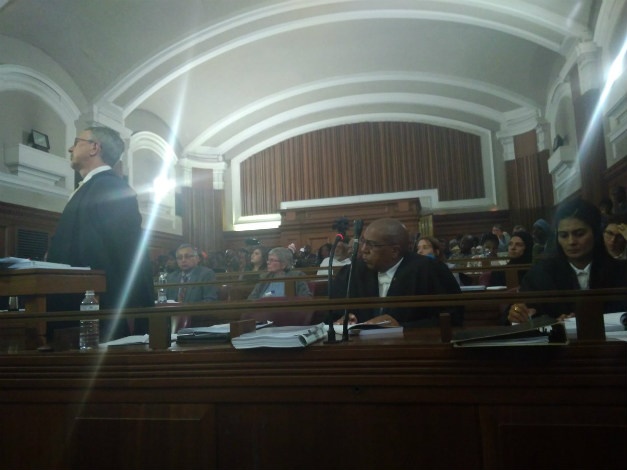
At 6pm on October 27 1971, after being held under section six of the Terrorism Act and subjected to daily interrogation and torture, Mohammed Timol was told by two police officers that his brother, Ahmed, had passed away.
“Can I attend the funeral?” he asked them.
“No, it wouldn’t be possible,” they replied, and they left Timol in his cell where he was being held at the Berea police station in Durban, to come to terms with what he had just been told.
This is what Mohammed Timol told the court in today’s proceedings on day four of the reopening of the inquest into the death of his anti-apartheid activist brother.
Apartheid-era judge JL de Villiers had ruled that Ahmed Timol had jumped to his death from the 10th floor of John Vorster Square, but many witnesses have come forward this week to speak out against this judgement, after the family of Timol appealed to the National Prosecuting Authority to reopen the case.
This week human rights lawyer George Bizos and friend of Ahmed Timol, Dr Saleem Essop, took to the stands.
His brother, Mohammed, told the court today that Ahmed would not have committed suicide because he had a “calling” to return to South Africa and engage in uplifting the people of South Africa who were constantly at the helm of the apartheid-led government.
“Ahmed died a week before his 30th birthday. He had a whole life in front of him.
"He did not have to leave England. He had a girlfriend in the United Kingdom that he introduced me to and I met her on quite a few occasions.
"She has kept in touch with the family, despite remarrying. But yet Ahmed returned, and in a small way began the process of building an underground resistance movement.
“Ahmed, for him it was a calling. I’m sure if he had lived and if he was tried with Saleem [Essop] and others he would have gone to Robben Island and he would have enjoying being with political leaders of the highest of integrity.
"And he would have studied. A few days before his detention he was writing his BA degree through Unisa. ” Mohammed said.
Just as Timol began his testimony, an unidentified woman boldly interrupted, saying that the courts had failed her because she was seeking justice for the deaths of her parents who were killed during apartheid.
Her mother was burnt to death.
The magistrate decided to take an early adjournment, as she was accompanied out of the court room. She continued to talk, citing section 16 of the Constitution.
“Excuse me, excuse me your honour. I beg the court to talk to me I am at the mercy of the court.
"I’m not one to take away from the importance and the terrors that this gentleman suffered, but I myself suffered tremendously under the apartheid era.
"My mother being burnt alive for the struggle, my father being murdered under the administration of Adriaan Vlok, minister of defence at that time.
“Nothing was done, the terrors that we faced, daily of police raiding the house, properties of my grandfather being confiscated for marrying an African woman. But the Constitution of the country is as such.
“I suffer now even worse than my grandchildren, and the courts are aware of the judicial bias.
"All my rights, the rights of my son and my grandchildren whom I have come to the courts repeatedly to ask for mercy, attorney firms were appointed under rule 40, I approached law societies, human rights attorneys, legal aid.
"I attempted to speak to Advocate Bizos, I attempted to everything, ran in circles in the country.”
Magistrate Billy Mothle interrupted her, saying she is disturbing proceedings, to which she held her left hand out and said: “No please this needs to be spoken.”
Mothle replied that she would get her chance to speak. She refused to leave, as she continued to relay her experiences at seeking some form of justice for her and family for the crimes inflicted on them during apartheid.
Court was adjourned abruptly, but she refused to budge. She went on for another 15 minutes before finally leaving the court room.
Journalists were told that the woman was mentally unstable and always disrupted court proceedings.
Court was adjourned until 2pm, when Mohammed Timol continued with his testimony.
Prior to Timol’s testimony, Professor Kantilal Naik took to the stand, where he too relayed his experiences of being arrested, detained and interrogated.
Naik was a teacher at Roodepoort Indian High School, where Ahmed Timol taught, and was subjected to torturous interrogation by security police, to determine if he was involved in any underground political activities with Timol.
Naik relayed his experiences of being beaten by the security police, to the point where he lost the mobility of his hands and had to undergo physiotherapy in order to regain the movement of his hands.
At the time of his arrest, he also worked at a pharmacy, and was arrested and taken into police custody, where he was held at John Vorster Square, now the Johannesburg Central Police Station.
For Naik, today’s proceedings was also pivotal in helping him to “clear his name”, because he said that many people thought that while he was in detention, he had perhaps said something which led to the death of Timol.
The proceedings would resume tomorrow at 9am.




 Publications
Publications
 Partners
Partners








